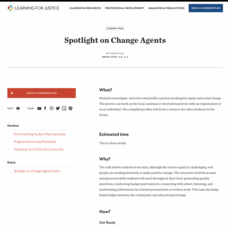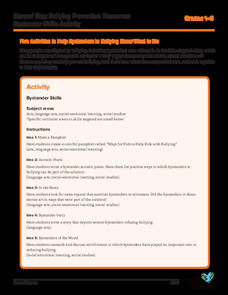Encyclopedia Britannica
Candidate Reflection Essay
After writing about which of the 2020 presidential candidates the class has researched most closely represents their ideas, young political scientists take a 2020 Presidential Election Candidate Quiz to determine what candidate they in...
Encyclopedia Britannica
Presidential Electability
There are specific constitutional requirements that candidates must meet to become president of the United States. In addition, there are societal opinions that affect a candidate's electability. Class members examine historical...
Encyclopedia Britannica
Political Issue Timeline
As part of a study of US Presidential elections, class members track the history of an issue in the 2020 campaign. They create a timeline to determine if there are any patterns, if ideas about the issue have evolved, or if in issue is no...
Encyclopedia Britannica
Candidate Position History Research
Climate change. Assault weapons ban. Death penalty. And the list goes on. So many issues are part of a US presidential election that it can be hard to determine a candidate's position on a particular topic and whether their position has...
Encyclopedia Britannica
Presidential Qualifications
Can anyone grow up to be president of the United States? As part of their study of the 2020 election, groups research the constitutional requirements to become president. The class then brainstorms a list of qualifications beyond those...
Nemours KidsHealth
Media Literacy and Health: Grades 6-8
Internet suffers could drown in the volume of information available on line. Here's an activity that can be a lifeline and buoy confidence in middle schoolers' ability to find reliable information and credible sources. After reading...
Encyclopedia Britannica
Do the Campaign Math
Follow the money trail! As part of their study of the 2020 Presidential campaign, class members to research how much money candidates have raise and spent, as well as the sources of the funds. They then graph their findings to compare...
Encyclopedia Britannica
Presidential Succession
"Who takes over if a president dies, resigns, is impeached, or is otherwise removed from office?" That is the question class members research. After listing the 18 successors in order, individuals respond in writing to a series of...
Encyclopedia Britannica
Candidate Position Research
As part of their study of the US Presidential election process, class members research a presidential candidate's position on a specific topic or topics. Formatting their research as a pro/con question ("Should the Death Penalty Be...
Encyclopedia Britannica
Candidate Flip-Flop or Evolution?
Beware political rhetoric! Connotation is everything! Groups select a presidential candidate and investigate how the candidate's position has changed on a specific issue. After analyzing the situation, the group determines whether they...
Encyclopedia Britannica
Candidate Book Report
After reading candidate biographies, class members select one candidate to research. They craft a report on the candidate's book, their position on issues, and the image the candidate wants to project.
Encyclopedia Britannica
Campaign Photo Analysis
It's the art of the image! As part of a study of the 2020 Presidential race, groups analyze an image of a candidate, first from an objective point of view and then subjectively. They then prepare a presentation detailing what they...
C-SPAN
What Are Ways for Youth to Engage in Politics?
Help young people become excited to participate in politics. High school historians participate in an engaging lesson focused on ways for youth to become involved in government. Scholars review articles, videos, and essential vocabulary...
Teaching Tolerance
Voting in Your Town
A socially important resource focuses on voter turnout and roadblocks to voting. Scholars review resources on voting stats, watch a documentary, and participate in group discussion regarding voting in their local communities. Academics...
Teaching Tolerance
Spotlight on Change Agents
A thought-provoking resource guides learners as they interview agents of social change and share their findings. Scholars select an individual, create questions, conduct the interview, and create a profile of the person they selected....
Committee for Children
Five Activities to Help Bystanders to Bullying Know What to Do
Five activities covering ELA, social studies, and social and emotional learning offer bystanders tips and the courage to help individuals being bullied. Activities include writing an acrostic poem, creating a pamphlet, reading current...
Facing History and Ourselves
Understanding Identity
Key to social-emotional learning is understanding who we are. The first lesson in an Understanding Identity unit asks class members to consider the factors that shape one's concept of themselves, the parts of their identity they choose...
PBS
Gloria Steinem’s Ancestry and Women’s Rights Movements: Lesson Plan | Finding Your Roots
Introduce class members to Presidential Medal of Freedom winner, activist, writer, and lecturer Gloria Steinem with a PBS resource that not only investigates Steinem's ancestry but also encourages learners to trace their own.
American Museum of Natural History
Trip Up Your Brain
Sometimes different parts of the brain disagree. See what this disagreement looks like using a remote learning resource to experience how brains often take shortcuts. Pupils complete the activity, observe their results, and then read...
American Museum of Natural History
Moving Mammals
How many different ways do mammals move from place to place? An online resource uses animation to show how different mammals move. Learners use a slider to speed up or slow down a variety of mammals. The versatile lesson works as a...
American Museum of Natural History
Extreme Mammals
Extreme characteristics can create some unusual mammals. Learners flip through a slide show of some of the most interesting mammals that are both living and extinct. Implement as a remote learning resource or use in-class to review...
Koshland Science Museum
Infectious Disease: Evolving Challenges to Human Health Middle School Virtual Field Trip
Is there one right way to control infectious diseases? Learners determine the facts each stakeholder must consider when making their recommendations for controlling a disease threatening their area. They take into account public health,...
National Academy of Sciences
Genetic Disease: Putting DNA to Work
Scientific knowledge of genetic information has grown quickly over the last decade. An interactive lesson has learners research the role of science and medicine in diagnosing and treating genetic disorders. They consider the job of the...
American Museum of Natural History
All About Cloning
Start seeing double. The American Museum of Natural History website provides pupils with information about Dolly, the cloned sheep. Learners find out the procedure used to create Dolly along with why scientists clone animals.

























